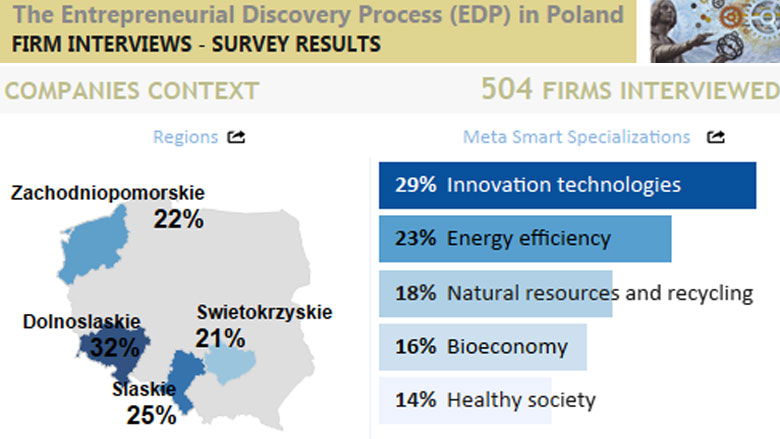WARSAW, 3 June 2016 – Poland’s small and medium sized companies (SMEs) have substantial innovation potential. Identifying the needs and strengths of these companies and uncovering the leaders should help ensure that their innovation and entrepreneurial potential is fully used. With adequate public support, such champions may succeed in the domestic and international markets, according to a new World Bank Group report, Toward an Innovative Poland: The Entrepreneurial Discovery Process and Business Needs Analysis, launched today in Warsaw.
Conducted by the Bank Group in 2014-2015, the report was developed to help the Polish government design an innovation support system that would enhance the impact of more than 10 billion euros Poland will invest in innovation by 2020, largely financed by the European Union. Using these funds efficiently will determine whether Poland will shift from imitating to generating new ideas, and thus converge with Western Europe.
Since 1989, Poland has been one of the fastest growing economies in Europe and has more than doubled its gross domestic product. Poland has also succeeded in improving the business climate. In the most recent Doing Business ranking, the country ranked 25th worldwide, climbing from the 76th position in 2009.
“The World Bank actively supports Poland’s efforts to invest in innovation. In collaboration with the Ministry of Economic Development, the World Bank Group has helped develop a new approach to prioritize innovation spending, and to update priorities based on the needs of Polish firms,” said Anabel González, Senior Director of the World Bank Group Global Practice on Trade and Competitiveness. “We look forward to supporting the country in this challenging but rewarding endeavor to develop entrepreneurial leaders and move Poland forward through innovation.”
The Entrepreneurial Discovery Process
The World Bank Group conducted more than 500 face-to-face interviews with the top management of mostly small and medium size companies from four Polish regions: Dolnoslaskie, Zachodniopomorskie, Swietokrzyskie and Slaskie. These discussions revealed that 40 percent of enterprises show high innovation-based growth potential. They are the “champions”.
The champions are characterized by high revenue growth rates, substantial investment in R&D, large export intensity, high proportion of STEM (science, technology, engineering, mathematics) employees, strong growth mind-set of the company’s management, and extensive networking with clients, suppliers, and other partners.
Interviews with entrepreneurs, and “Smart Lab” workshops with representatives of business, science and research and development institutions, and public administration helped identify the most critical barriers to growth faced by Polish companies. These include access to financing, access to new markets, availability of skilled personnel, low levels of networking, availability of “soft” skills, and attitudes toward innovation among owners.
The interviews also showed that one fourth of firms are companies that do not yet seem to fully leverage their growth potential. They could grow much faster if they were “awakened” through, for instance, improved management practices, better access to “smart” financing and support for exports.
“The advantage of the entrepreneurial discovery model is that it is based on a bottom-up process geared to identify demand, needs and capabilities of Polish firms, and that helps put business in the driver’s seat of innovation policy,” said Marcin Piatkowski, World Bank Senior Economist and the project’s leader.
“By talking to the private sector, the government can better identify what the technology trends are and where the best firms want to go. The government should rely on the principle that “you cannot change the direction of the wind, but you can move the sails”. We believe that the knowledge gained during the entrepreneurial discovery process, once it is rolled out across the country, would help Poland better prioritize its innovation spending priorities, adjust the public support system to the needs of the private sector, and focus it on economic activities with the largest innovation potential,” added Marcin Piatkowski.
The World Bank Group
The World Bank Group's (WBG) mission is to fight poverty and improve living standards for people in the developing world. The World Bank Group comprises five institutions: the World Bank, including the International Bank for Reconstruction and Development (IBRD) and International Development Association (IDA); International Finance Corporation (IFC); Multilateral Investment Guarantee Agency (MIGA); and International Center for Settlement of Investment Disputes (ICSID). Operating in over one hundred countries, the World Bank Group institutions provide financing, policy advice and other support services to help countries solve their most burning development policy issues.
Poland has been a member of the International Bank for Reconstruction and Development since 1986. Since then, the World Bank Group has been one of the most prominent institutions supporting Poland’s growth and development, providing in total USD 16 billion in loans supporting 80 projects.


